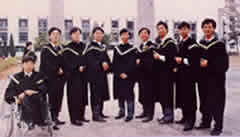Charles Leung remembered one long hot summer, when he was just one year old... he contracted polio. After he fell ill, life changed drastically.
"Ordinary people often do not cherish their health. People with disabilities take special care of themselves, as they need to spend so much extra effort, just to cope with every day life. Even though people with disabilities experience a great deal of frustration, they still have to overcome their difficulties and psychological barriers, to ensure their place in society."
Charles Leung's first step in this direction was his insistence on studying in a regular school. There was no "Integrated Education Program*" at that time, and schools generally lacked facilities to cater for the needs of students with disabilities. Despite these circumstances, he made every effort to overcome the myriad of difficulties facing him. He wanted to attend a regular school in order to meet other children, adapt to life in mainstream society and ensure his own integration into the community.
His loving and caring parents
Charles Leung's parents were not educated, and were uncertain about what would be best for their disabled but lovable son. They felt helpless that solutions were not readily available. They spent every cent of their savings to try and cure their son's disability. They even sent Charles to a physician in Guangzhou, in a bid to help him walk again. Eventually, they had to accept the fact that their son would not be able to walk for the rest of his life. Charles' mother then sent him to a special boarding school for children with disabilities.
style="text-align: justify;"
Just a regular school
Charles became a top student in that special school. When it was time to attend secondary school, the Education Department and his school arranged for him to study in a special secondary school. Surprisingly however, Charles insisted on repeating primary six in a regular school, in order to sit for the secondary school entrance examination. Although he was young, Charles realized that he no longer wanted to spend his time in a protected environment. On the contrary, he was determined to live just like everyone else to earn his livelihood in the community. After much insistence, the Education Department arranged for him to study in a single-storey rural school which was accessible to Charles. After working extremely hard that year, Charles excelled in his examinations and gained a place in a regular school.

It was no easy task studying in the regular secondary school. Hardly any secondary schools were equipped with elevators at that time, and the school where Charles was studying was no exception. Charles had to rely on his own strength and his crutches to climb the stairs, up several floors, to attend lessons everyday. His classmates and teachers were eager to help and when Charles needed to go to classrooms on the different floors, his classmates would place his wheelchair by the staircase to await his arrival. His teachers also understood that it took him longer to reach the different classrooms.
style="text-align: justify;"
Social work? Helping others, helping himself
With his excellent results attained in the Hong Kong Certificate of Education Examination, Charles progressed through matriculation, later graduating from the Social Work Department of the Chinese University of Hong Kong. Charles' determination and hard work prove that people with disabilities do not have to depend on social assistance or the help of others. Actually they can help others and make a valid contribution to society.
Charles joined the Social Welfare Department as a social worker after graduation. Since then, he has been able to help many clients. His most unforgettable experience was a Form 4 student, who was suffering from a mental illness. The young student would not have his hair cut and was unwilling to leave his room for months on end. At first, he refused to talk to Charles, doubting whether this social worker in a wheelchair could offer any help. With the passage of time, he was more willing to accept Charles' counseling. He was tremendously impressed by Charles, and his love for life. The young student later visited Charles to express his gratitude. Sharing the joys and sorrows they had been though, they burst into tears.
Integrated Education in Hong Kong
For Charles Leung, Integrated Education came too late for him. It is only in recent years that Integrated Education has become a major trend. "Better late than never," he sighs. Charles states his support for Integrated Education as the program offers a choice for students with special needs, enabling them a chance to study in regular schools. "With the program, students with disabilities are able to live, learn and grow within the community." Charles emphasized.
As most tend to forget, Integrated Education also benefits students without disabilities, as they learn to accept people who are different from themselves. They become ready to accept and to care for others.
* "Integrated Education" establishes a caring school culture and encourages the acceptance of students with special educational needs. Based on the needs of students, individual education plans will be drawn up and necessary assistive device will be provided. The program aims to develop a sense of "Inclusion and Equality for All"?